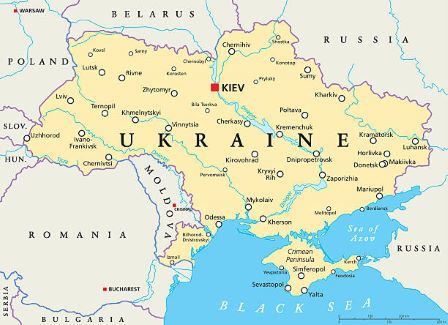When we live in peace and safety with time to dwell on our actions and how we live, ironically, this peace can be a source of danger if it decreases our alertness. For this reason, we are admonished to be watchful: “Therefore, stay awake, for you do not know on what day your Lord is coming,” (Matthew 24:42 ESV).
In February and March 2014, the world was watching as Russia began to invade the region of Crimea, previously connected to Ukraine. This historic case study enlightens us to how fragile our world is and how quickly a conflict can emerge, triggering events in surrounding nations.
Ukraine sits in the Eurasian Steppe, a land rich with arable soil and mineral resources. Nearby Crimea is a peninsula jutting into the Black Sea and has similar resources. In addition, control of the Crimea allows access to the Black Sea and Bosporus Straight, leading to the Mediterranean Sea, a commercially and militarily strategic location.
The nation we know now as Ukraine, has a complex, overlapping history. Its heyday was under the Kievan Rus in the 9th through 13th centuries, then the Mongols destroyed much of that empire and the seat of power for the Rus moved from Kiev to Moscow. After the Mongols, Ukraine was carved up by various European powers until it fell, at last, to Russia under Catherine the Great in the late 1700’s.
The Crimea was controlled by Greeks, then Romans, and destabilized by the fall of Rome, riddled with tribal divisions. Attacked by Mongols, it became a home for Turkic tribes who conducted an active and brutal slave trade enriching the Ottoman Empire to the southeast and carrying many ethnic Ukrainians and Russians into slavery. The Russians conquered these same Turkic minorities occupying the Crimea, and you can see where the historical tension originates.
The Russian-Turkish conflict flared in 1783 and continued for 400 years. During the Crimean War (1853-1856) the Russians sought a warm water port for their navy in the Black Sea, and almost every major European power became involved in this conflict, setting up disastrous alliances that would eventually lead to the First World War. In World War II, Ukrainians under the USSR welcomed the Nazi invaders until they were enslaved by them, but turning back to the Russian side they were further oppressed by Stalin, sent to Siberia, or massacred in the millions, among them many Jews.
Inexplicably, in 1954 the Crimea was added to Ukrainian territory by the USSR. In 1989 Ukraine and Crimea declared independence from Russia as the USSR dissolved. And that brings us to today. Crimea is now an annexed country of Russia and remains a valuable target with land, natural resources, and strategic ports. Russia’s ambitions in the region have already drawn in surrounding Asian, Middle Eastern, and European nations, and the United States.
And Russia’s recent invasion of Ukraine continues to bring enormous death and destruction to the Ukrainian people and their nation. It reminds us that those conflicts, like the events preceding the return of Christ, can build up rapidly and from seemingly out of nowhere: “And you will hear of wars and rumors of wars. See that you are not alarmed, for this must take place, but the end is not yet. For nation will rise against nation, and kingdom against kingdom, and there will be famines and earthquakes in various places,” (Matthew 24:6-7).
When we see these hot spots in the news, we should feel a sense of urgency, but not panic. Be alert, watchful, knowing the world is a fragile place, but that we are still blessed with peace. We need to take advantage of that opportunity and not let it slip through our fingers.
Studying history has additional value for us because it gives us perspective and empathy. We can understand why people do the things they do because we learn where they came from and how they react. This ability to empathize is going to be crucial in our role in God’s Kingdom. We all experience pain, joy, suffering, betrayal, depression, and love. Christ experienced all of that, too, and He responded to it perfectly. That should give us hope, and inspire faithfulness because if He can overcome, having been a human like we are today, then we can do it, too.
We need to renew our minds and bodies for the work ahead of us. Remaining watchful and alert both in our personal lives, but also as we relate and live in the world around us. Stay aware. This mindset provides us with a much-needed sense of urgency and commitment to our Father and His way of life.
Ryan Andrews


